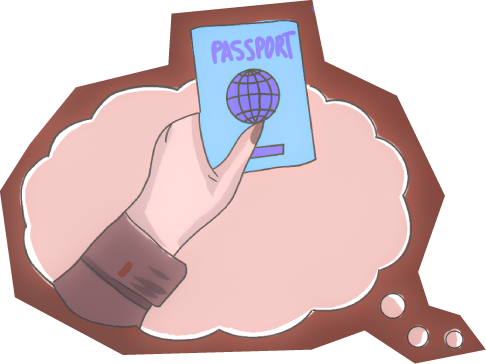
Fates of 'Forgotten Ones' in Tajikistan






"A man in the air"

68-year-old Mavdjuda Allanazarova, resident of village jamoat Istiklol, is one of those who remained without documents after the collapse of the Soviet Union. During the civil war, 1993-1994, representatives of the passport office came to the village, gathered their Soviet, red passports, and promised to issue new ones instead. After a while, they did it, but not to all. Mavdjuda did not receive her new passport. It did not disappoint the woman then, she thought the document was just a formality.
- "At the time, I did not understand that every country would have its own borders, laws and documents after the collapse of the Soviet Union. Until I faced a situation when I needed my passport," said apai Mavdjuda.

The real state border emerged between Tajikistan and Uzbekistan. Now to visit relatives in the neighbouring state the woman has to have a registered identity document. But she did not have it. Mavdjuda could not find her birth certificate. Then she became worried.
Mavdjuda was born in the Uzbek SSR, and she needed help of her relatives to find her birth certificate in the archives of Uzbekistan. In the meantime, the woman began to search for the Soviet passport seized by authorities. After a while, she needed her marriage certificate, which was lost somewhere as well. Thus, it took her over 15 years to gather, restore and obtain the citizenship of Tajikistan.
Mavdjuda was born in the Uzbek SSR, and she needed help of her relatives to find her birth certificate in the archives of Uzbekistan. In the meantime, the woman began to search for the Soviet passport seized by authorities. After a while, she needed her marriage certificate, which was lost somewhere as well. Thus, it took her over 15 years to gather, restore and obtain the citizenship of Tajikistan.
- "I did not have any rights without the document. My nieces laughed at me and called me 'a man in the air'. At first, it was funny, but then it became offensive. I worked at the collective farm for years. They told me that I would not be able to receive pension without documents. I did not receive invitations for elections, could not pay utility bills. When I first received the passport of Tajikistan, I wept with joy. My husband organised a celebration for me to celebrate my citizenship," Mavdjuda said.
Challenges and reforms of Tajikistan
According to the UNHCR Tajikistan, since 2014 over 60 thousand people risked to become stateless. This category also includes people who are de facto stateless. In other words, foreign citizens who lost their citizenship for some reason. Until the end of 2023, over 58 thousands of them received decisions regarding their status.
According to the law "On an Ombudsman for human rights in the Republic of Tajikistan" passed in 2008, it was specified that the ombudsman staff receive complaints from stateless persons in order to restore their violated rights and freedoms. Moreover, provisions regarding prevention or reduction of stateless persons have been enshrined in several international treaties on human rights.
Besides, in order to avoid discrimination of all persons, including stateless ones, Tajikistan adopted the law "On equality and liquidation of all forms of discrimination" on July 19, 2022 , which made the Ombudsman for Human Rights in Tajikistan the authorised government body to ensure equality and liquidation of all forms of discrimination.
Currently, all regions of the country have functioning offices of the Ombudsman for Human Rights. The journalist of CABAR.asia asked how often they receive requests to obtain citizenship from unregistered persons.
According to the law "On an Ombudsman for human rights in the Republic of Tajikistan" passed in 2008, it was specified that the ombudsman staff receive complaints from stateless persons in order to restore their violated rights and freedoms. Moreover, provisions regarding prevention or reduction of stateless persons have been enshrined in several international treaties on human rights.
Besides, in order to avoid discrimination of all persons, including stateless ones, Tajikistan adopted the law "On equality and liquidation of all forms of discrimination" on July 19, 2022 , which made the Ombudsman for Human Rights in Tajikistan the authorised government body to ensure equality and liquidation of all forms of discrimination.
Currently, all regions of the country have functioning offices of the Ombudsman for Human Rights. The journalist of CABAR.asia asked how often they receive requests to obtain citizenship from unregistered persons.
- "We are in the fourth year of our work. So far, we did not receive any such request. However, we keep on working," said Khabiba Khamidova, representative of the Office of the Ombudsman for Human Right in Sughd region.
According to the woman, the situation of statelessness in Tajikistan is ambiguous. There are not special researches that determine the number of people without documents residing in the country. However, there is a non-governmental organisation "Chashmai khayot", which mainly deals with labour migration issues and prevents human trafficking. Unregistered people often turn to them regarding employment, and they are redirected to the committee of women and family affairs at the executive branch of the government.
Rafoat Boboyeva, family advisor of the agency, studied the situation of a man, who had no documents, and referred him to the administrative-legal department of the Khukumat, Sughd region.
Rafoat Boboyeva, family advisor of the agency, studied the situation of a man, who had no documents, and referred him to the administrative-legal department of the Khukumat, Sughd region.
- "By results of joint work of the state authority and non-governmental organisations, the man had his identity documents restored. Now he can find a job and improve his living standard," said Rafoat Boboyeva.
In December 2019, the government passed a law permitting stateless persons and foreign citizens residing illegally in the country and violating the rules of stay (for former citizens of the USSR) to legalise and resolve their legal status. The Amnesty Law was in force until December 2022, after which all persons falling within the purview of the law should have applied for legalisation. The UNHCR appreciated the law as an important step in fighting statelessness in the country.
The government, UNHCR and partners from NGOs implement the project to identify and make decisions for stateless persons and persons with unidentified citizenship, such as citizens of former USSR, in five regions of Tajikistan.
The government, UNHCR and partners from NGOs implement the project to identify and make decisions for stateless persons and persons with unidentified citizenship, such as citizens of former USSR, in five regions of Tajikistan.
- "The right to citizenship is one of human rights. The government is committed to solving this issue," said Khisrav Kholov, Assistant Protection Officer, UNHCR Tajikistan.
According to Khisrav, joining the Global Alliance to end statelessness may become an important step to prevent the problem. The government should consider this issue jointly with partners. This decision could draw attention of all concerned donors for provision of financial assistance.
Despite all efforts of the government of Tajikistan, the problem of stateless people remains severe and unsolved. According to experts, people get trapped in a maze of bureaucracy and are deprived of basic rights and social protection. Further efforts are needed to solve their problems and ensure equal opportunities by law to all citizens of Tajikistan.
Despite all efforts of the government of Tajikistan, the problem of stateless people remains severe and unsolved. According to experts, people get trapped in a maze of bureaucracy and are deprived of basic rights and social protection. Further efforts are needed to solve their problems and ensure equal opportunities by law to all citizens of Tajikistan.